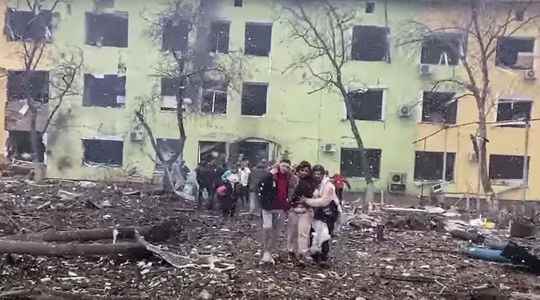My generation was able to believe in a future of peace and tolerance. An illusion that Russia’s attack on Ukraine has killed once and for all. I was born in 1982. I was 7 when the Berlin Wall fell. As a teenager, I saw the Internet and its promise of interconnecting the whole planet become part of my daily life. By the time I was in my early twenties, democracy was steadily expanding in the world.
For my generation, the hope for a better future was in no way the prerogative of incorrigible optimists. Despite serious setbacks – from the civil war in Yugoslavia to the terrorist attacks that rocked the United States on September 11, 2001 – the assumption that the world was becoming more peaceful and more tolerant seemed to be confirmed in practice.
The number of wars was actually down. The most aggressive forms of nationalism were for real slipping away. The share of the human population free to speak and express their preferences at the ballot box was truly skyrocketing. For a few precious years, a cosmopolitan optimism trading the narcissism of small differences for the approval of a common humanity seemed to be the dominant ethic of the most powerful countries in the world.
And so it was easy to liken the disturbances of the matrix to mere anachronisms about to be overcome. Many representatives of my generation have seen only “old hatreds” in civil wars galvanized by ethnic pride, have minimized the revival of religious fanaticism by considering it limited to a small fringe of extremists and have made fun of the belligerent nationalists by calling themEwiggestrigeof “stuck in the eternal past”.
At twenty, the rise of Silvio Berlusconi and Recep Tayyip Erdogan, Hugo Chavez and Vladimir Poutine worried me a lot. But deep down I thought I knew they were just remnants of a dark past that couldn’t really come back – just crooks and fanatics, ideologues and warmongers who had lost in advance. But just as sometimes the past is actually a prologue, so what might at first sight seem anachronistic can be a vanguard.
Deeply depressing scenarios
At present, that the dominant consensus is mistaken in its reading of coffee grounds is obvious. The world has just entered its sixteenth year of democratic recession. Social media has been a melting pot of tribal narcissism, not mutual understanding. From the survival of democracy in its traditional homes to our collective ability to rein in the ambitions of the world’s most ruthless dictators, nothing seems certain anymore.
It turns out that chauvinism and ethnic pride, demagoguery and the thirst for conquest are in no way the preserve of a specific historical era. It is about entirely human potentialities, always lurking in possible futures if our vigilance ever weakens and our institutions prove incapable of mastering the worst instincts of humanity – namely the failure they have just sign in the heart of Europe.
Vladimir Putin’s war against Ukraine has deep historical significance for several reasons. It is the first time since World War II that a European country has so brazenly invaded another for the purpose of territorial conquest. An offensive that has already killed a large number of innocent people. Here’s what we know. But there are still a lot of things we don’t know.
Perhaps the Ukrainian people will prove capable of defending their freedom. That the country will become the graveyard of the Kremlin’s neo-imperial ambitions. Or that a protracted conflict of its own making will precipitate Putin’s personal downfall.
But despite Ukraine’s impressive bravery, the plausibility seems to lean more toward deeply depressing scenarios. Perhaps Putin’s war on Ukraine will be a big step towards building a new Russian Empire. And perhaps it will even be the prelude to an even more serious conflagration in Central and Eastern Europe.
Vicissitudes of History
The true consequences of the invasion will not be known for years, if not decades. But, in the realm of ideas, one of its implications is already strangely obvious. Putin’s invasion of Ukraine put an end to the optimistic apprehension of the future that prevailed in the Western world in the decades after the fall of the Berlin Wall. For a long time, the certainties on which we have built our vision of the world have been transformed into illusions; the missiles that fell on Ukraine in the early morning of February 24, 2022 confirmed the completion of the metamorphosis.
I have never set foot in Ukraine. As is often the case with countries that you have not visited yourself, the names of its cities sound like abstractions. But many of my ancestors lived and died in the territory now targeted by Russian missiles. My grandfathers, Leon and Bolek, and my grandmothers, Chava and Mila, were all born in or around Lviv. Their lives have been deeply marked by the vicissitudes of history. They lost their parents, grandparents and most of their siblings to the ravages of the Holocaust.
As I watch the horror unfolding in Ukraine, I keep thinking that their children’s generation, born just after the Second World War, is the first in a long line to enjoy peace and relative safety. While my parents’ lives may have been violently disrupted by political forces beyond their control when a state-sponsored anti-Semitic purge drove them from their homeland, they never had to mourn the loss of a relative because of war, famine or ethnic cleansing.
There was a time when I took it for granted that my world would be much more like that of my parents than that of their ancestors. I was, I thought, lucky to have been born in a more enlightened age, when mutual understanding was on the rise and conquest-hungry dictators were at half-mast. But the lesson of Putin’s ruthless war on Ukraine is that even this modest hope could be an illusion.
